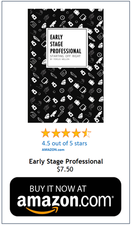- Professional Skills -
business reports & presentations
by fergus mellon

Presenting ideas and recommendations in either a formal report or in a presentation is something that you are going to do as an Early Stage Professional and indeed throughout your career. As an Early Stage Professional it is likely that in place of working on a presentation that is truly your own, you will be working on something that your manager will either be using for a meeting or if you are very lucky giving you the opportunity to present. This means your manager will provide a great deal of input, particularly at the editing stage. In this section I will highlight not just some of the pitfalls to avoid in your early days of getting presentations and reports together, but some quick and easy pieces of advice to make them less painful to get together. Oh yes, reports and presentations are painful! This is not a Science Project! While at college you may have worked on a dissertation where your Professor would read all 25,000 words, in the workplace you will likely have 10% of the space to make your point and your manager will only care about really actionable information. Think "Business Level". I have sat through too many presentations where very intelligent individuals have failed to make their point or recommendation. Instead they have made a presentation that was basically "I was asked to do this work and so this is everything I did on the project and this is all the data I have. I am really smart." In one memorable presentation where we were meant to hear about how effective a new product enhancement was for a major customer, we instead went on a tour of statistics complete with mention of 99.99% statistical significance and a host of other quant-type jargon. These things may have been very important to the analytics team running the test, but were not important to any of the business teams who wanted to know the answer to a simple question but exceptionally important question: does it work? We all trusted the analytics team to present great data and did not need to review all the original data: we wanted actionable data! How to think beyond the numbers: make the presentation BUSINESS-level and keep it as to the point as you can. Can you give an answer to help move the business on? If you can do this, do it. If there are follow-up questions on the numbers (there rarely are, trust me!) then deal with those either as questions (and talk “statistical significance” until you are blue in the face!), but do not lead with the weeds: instead give an answer! Report - Summary sections: One thing that I have found really helpful when presenting a lengthy business report is to have a high level summary in each report section with the key findings and recommendations clearly set out in bullets and then the detail below. It goes to my point above about getting the core findings out there for the reader and then if they want to have all the detail they can delve into the details in the later section. Although you may feel that your work is wasted if senior members of your team do not read every line of the report do not make that mistake. The purpose of all these reports is to get your recommendation out there and agreed to. As an added bonus if you get the recommendation agreed to efficiently then you will have really succeeded! PowerPoint - Images not Essays: Have you ever sat through a presentation where the slides were impossible to really read because there was too much text on them? I have and in addition to that have had to sit through presentations where the presenter then decided to read every line on the slides! What was the point in making a presentation if the attendees could have read the report you made? What was the point in calling it a presentation when really it was a written report put in PowerPoint? Instead when making a presentation think about what is going to grab the attendees' attention and make them listen to your argument. I find having slides with clear images of my core message helps way more than a ton of text does. I try to find attention grabbing images that talk to the point I am making and then have key highlights on the slides. If you focus on making the slides complement what you are saying you will more likely win in terms of gaining attention for your work and if you get the attention and your argument/idea is good you will more likely get your own way. This, though does not mean you can be unprepared. When I have summary slides I frequently have the supporting information with me to present if I need to go into significant detail. But in the same way as with reports (above point) where I present the highlights first, I use PowerPoint to also get to the key points. Check-in With Your Manager: To ensure that your presentation is going to meet the needs of your manager, check-in with them along the way. If you are doing a formal, hour long presentation I would recommend at least providing the outline two weeks ahead of the presentation (assuming you have been given more than two weeks notice!). If you only have a short time to complete the presentation, work to get the outline to your manager for their review immediately. This will ensure that you are going to complete work that will meet their needs and minimize any last minute scramble through having missed an idea that was important to your manager. Even if you do not get feedback from your manager in a timely fashion, it should help "shame them" if they come to you with last minute changes. This could even ease the pain you face in that they may (and I stress may!) be guilted into making the changes themselves and so avoid keeping you in the office late! If you are making recommendations that impact another team, speak to them first! One thing that will screw up a presentation more quickly than almost anything else I have seen is if you make a recommendation or statement about what another team should do and they start to disagree with you in the meeting. Even if you are right about a recommendation, the fact that your meeting has turned into an argument is going to at least delay your recommendations being implemented and at worse could make you look as though you ambushed the other team and so are not a good team player. If your presentation talks about another team, spend time with the leaders of that team and ensure they agree with your recommendation. If you can demonstrate in your presentation that you have the support of the members of another team you are going to look like an ace: you not only have done a great piece of work, but you also secured the buy-in of another team and so are a truly effective professional. If you can, forget the slides: While it can feel comforting to have 101 pages of slides for a presentation, if you can get away with it try to do without them! I have found that some of my most successful presentations to very senior management (the heads of business units at billion dollar plus media companies) have been when I came with a page of hand written bullet points and key data and then discussed my ideas and goals openly and in partnership with leaders from other teams (see above section on getting buy-in ahead of the meeting!). By making the presentation to senior management less formal and more like a conversation I have been able to secure buy-in as well as gain their ideas to further round out my proposal. I always follow-up with a meeting summary so everything we discussed is documented, but have found taking away the PowerPoint has almost acted as a relief to Senior Management (they probably get 10 PowerPoint "presentations" every day) and really helped me to get my own way. Oh and it typically saves me significant time by avoiding the pain of building a ton of slides! Presenting Pet Peeve: Probably number 29,062 of my peeves. If you are presenting slides and you notice a typo do not say: "This slide is wrong, what I meant to say is..." This is a rookie error. No one really notices, until of course you say it! As no one will notice the error just keep your mouth shut and focus on getting your message out there. Most people will be listening to you and not reading all your slides. Next section: Social Media, Personal Email and Hanging Out on the Web Related Columns: "Presentation Panic? How to Overcome It" and "The Office As A Stage" 
In the first 5 or so years of your career? Want actionable career advice? Buy Early Stage Professional: starting off right, the no nonsense professional skills book designed so that everyone can succeed in the workplace!
Got feedback? Send it to [email protected]
|

